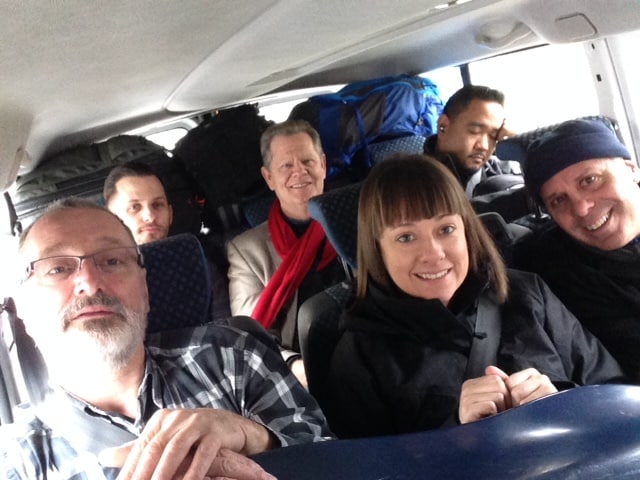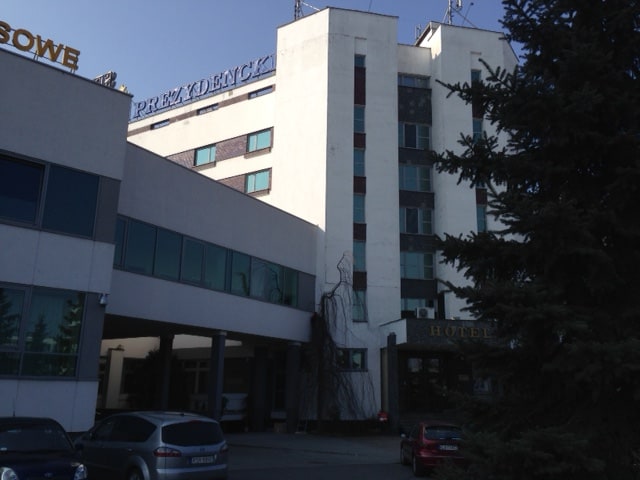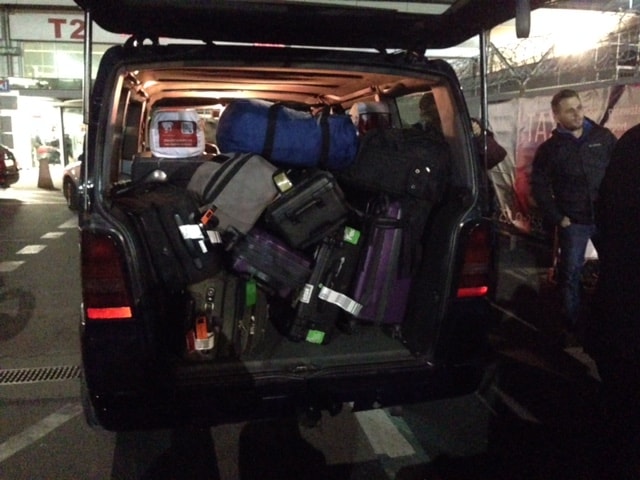
The trip to Rzeszow was challenging but fun. Our departure from Krakow’s Hotel Pod Roza was delayed because of a street marathon which route ran right in front of our hotel. The fact that the route was evidently a shortish circular one bringing the runners around every 15 minutes or so only dawned on us after a couple of passes. Not to worry – it was an otherwise lazy day, the first in fact to date on this itinerary where we merely had to travel. The Sunday morning traffic was otherwise light but having packed up the van – a virtuoso tour-de-force by our driver “Kaz,” (for Kazimir), we shoehorned ourselves into the remaining space for the 2 hour high-speed drive. We were headed down to the southeastern extremity of Poland in the southern Carpathian mountain district, a popular vacation destination directly bordering with both Ukraine and Slovakia. Our hotel comprised both very modern wing incorporating a convention facility and was connected to a perfectly maintained communist era block.

We stayed in the latter while the film crew were established in the modern center. The contrast was truly insightful, providing a glimpse into the local economy as well as a reminder of how far this country has come since the late 80’s. Rzeszow is proudly possessed of a beautiful modern Filharmoni complex where we were delighted to perform the next night. Meanwhile we each explored the nearby old-city center as well as some of the hostelries and taverns surrounding the old town hall square. The juxtaposition of at least three ultramodern shopping centers in this small city, alongside the mostly pedestrianized historic city center and a healthy supply of communist residential cinderblock style housing high-rises presented a multi-faceted impression. The audience for our program the next evening was rather younger than many and the hall memorable for it’s offset geometry and superb acoustics. Without a printed program (by design), our concert was narrated by a gracious local TV celebrity. She introduced the quartet, providing a description and brief analysis of each work between pieces. Once more we received a standing ovation and were delighted to offer Shostakovich before heading back to our hotel to change and venture back into the old city center on foot to enjoy a beer and some fine traditional Polish soup. As has been the case for many of these concerts, the start time was 7pm, quite early and thankfully allowing time to venture out afterwards for a bite to eat and a little socializing – sometimes even with the locals.
 We continued early on Tuesday morning, leaving a half hour earlier than originally planned for our trip to Warsaw. Kaz once more chauffeured his trusty 8 passenger Fiat people mover and once again demonstrated his stunning skills in packing so much sound and video equipment into a vehicle in addition to the quartet’s essential baggage and instruments. Sequence is everything and based on his previous experience, he tweaked the plan slightly and managed to make a little more room for this almost 6 hour trip. In the absence of a motorway route to Warsaw, we encountered motorized farm equipment and tractors aw well as 12-16 wheeled commercial freight trucks on our northbound route. It was a thoroughly entertaining ride, affording a little time for napping, catching up and a break for lunch and a BP service station which offered a superb restaurant quality meal in remarkably short time. Traffic intensified as we approached Warsaw and our luxurious hotel – the Regent Warsaw. We were happy to install ourselves for an hour or so into our new digs and shake out some of the road-warrior kinks and cobwebs. Our rides to the Warsaw Philharmonic Hall awaited at 5:20 precisely – a fleet of three elegant black BMWs taking us to our appointed rehearsal with Russian/American pianist Boris Berman. We arrived a few minutes early, in time to catch the tail-end of an impressive rehearsal of Benjamin Britten’s Turn of the Screw, programmed in the Festival for Saturday evening. It’s a performance scheduled for the main hall of the Philharmonic for Saturday evening that we certainly wont want to miss!
We continued early on Tuesday morning, leaving a half hour earlier than originally planned for our trip to Warsaw. Kaz once more chauffeured his trusty 8 passenger Fiat people mover and once again demonstrated his stunning skills in packing so much sound and video equipment into a vehicle in addition to the quartet’s essential baggage and instruments. Sequence is everything and based on his previous experience, he tweaked the plan slightly and managed to make a little more room for this almost 6 hour trip. In the absence of a motorway route to Warsaw, we encountered motorized farm equipment and tractors aw well as 12-16 wheeled commercial freight trucks on our northbound route. It was a thoroughly entertaining ride, affording a little time for napping, catching up and a break for lunch and a BP service station which offered a superb restaurant quality meal in remarkably short time. Traffic intensified as we approached Warsaw and our luxurious hotel – the Regent Warsaw. We were happy to install ourselves for an hour or so into our new digs and shake out some of the road-warrior kinks and cobwebs. Our rides to the Warsaw Philharmonic Hall awaited at 5:20 precisely – a fleet of three elegant black BMWs taking us to our appointed rehearsal with Russian/American pianist Boris Berman. We arrived a few minutes early, in time to catch the tail-end of an impressive rehearsal of Benjamin Britten’s Turn of the Screw, programmed in the Festival for Saturday evening. It’s a performance scheduled for the main hall of the Philharmonic for Saturday evening that we certainly wont want to miss!
For our own rehearsal, we had been eagerly anticipated working with Mr. Berman. We have known Boris by reputation for many years – a world-renowned artist and pedagogue, he is one of the many treasures of Yale’s School of Music, although an appointment there post-dating our own association with that august institution in the early 1980’s. This was our first meeting and as is bound to happen from time to time, he was not feeling well. Nevertheless he put his discomfort aside and soldiered through as we enjoyed getting to know each other through Brahms Op. 34. At times it was difficult to know who was suffering more, Boris or Zak who also has been wrestling with a serious cough/cold but the music-making was all there as we discovered a shared and sympathetic affinity in our approach to this beautiful work. After essentially a play though with just a few comments and tweaks, we called the rehearsal, heading alternatvely back to the Regent for most and for me, a chance to sit down with our miraculous “Mira,” the lovely and essential coordinator of all things logistical. Over coffee, we reviewed the schedule for the next two days including train schedules, logistics personnel, ground transportation and so forth and then found time to drop in on the opening of the evening’s Festival concert in the Main hall of the Philharmonic. The program presented the music of Mascagni on the occasion of the 75th anniversary of his death, performed by the Polish Orchestra conducted by Massimo Caldi. The orchestra, the music and the venue impressed this listener powerfully. What a sound and what gorgeous artistry to celebrate a frequently sidelined composer!
The trip to Gdansk began once more with our dedicated fleet of cars taking us to the central station in Warsaw where we had an appointment to “met our maker” – the luthier I mean, in the person of Francis Kuttner, maker of the fabulous quartet of Strad model instruments that we play on, better known as the Ellen M. Egger Quartet. Francis has been in Paris on business and was delighted to make this excursion to join us for a part of our exciting tour of Poland. Together we boarded the express to Gdansk for the 3 hour trip to the historic city and home of the Solidarity movement. We were met by a pair of cabs which took us swoftly around and then into the old city and our lovely hotel adjoining the Gdansk Baltic Philharmonic Hall which sits on an island all its own. We checked into our rooms with just enough for a quick and delicious lunch before being whisked off again to the Music Academy. We gave a four hour masterclass for the string, piano and wind students of this fine institution. The Academy graciously provided refreshments for the afternoon, no doubt to ensure we didn’t nod-off but the level of playing was so arresting and constantly engaging that there was no chance of any such distraction. The generous supply of tempting chocolate biscuits, coffee and tea were shared with the students, faculty and audience alike as we all celebrated the wonderful chamber repertoire, terrific instruction and talented hardworking students. What a great afternoon!

The evening was ours to enjoy without encumbrance and we took the opportunity to relax and explore separately and together, eating fine Baltic cuisine and sampling excellent Polish beer and even a vodka (possibly two)? The next day’s rehearsal in the Philharmonic Chamber Hall was a revelation of just how fine a simple room can sound when the materials and proportions are just right. Seating just about 200 people, the room was am acoustic dream come true. Moreover, the hall was all of a 30 second walk from our hotel… how convenient is that? Zak even sprinted across the cobbled courtyard in the light rain without a coat or umbrella! The moisture was welcome for ourselves and expecially the instruments too which all seemed to enjoy the bonus humidity. Zak had spent the early afternoon with Francis making some adjustments to the setup of his fiddle and Paul too had taken advantage of a few minutes of some focused attention from our favorite luthier on this viola. all in all, such a picturesque setting surrounded by water and ancient maritime buildings and vessels, this has proven an unforgettably beautiful venue.

To add dimension to this excursion, I had spent nearly three hours that morning at the landmark Solidarity Museum, a stunning monument, memorial and historic informational institution providing testimony to Poland’s struggles of the past century. The beautiful and inspiring new building designed by a Gdansk based firm Fort Group, was officially opened just last year. As my photos attest, though they hardly do justice, the architectural structure which houses a library, offices (of President Walesa and many more), restaurant, gift shops, conference, lecture and meeting facilities and an impressive indoor garden is stunning. The exhibition itself is dynamic, and engrossing from the start. I can hardly say to finish since after three hours, I felt I was only beginning to grasp the significance of the story that is being told. It’s a place demanding a return visit for which I’ll allow even more time.
